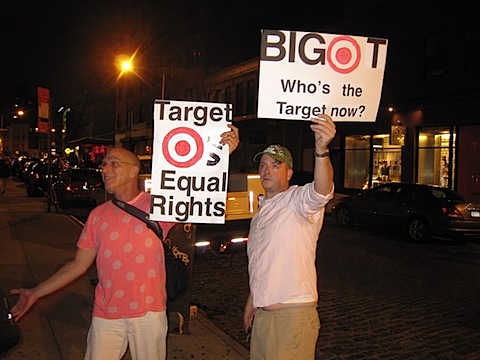I’m a supporter of LGBTQx rights and of organizational diversity.
As an individual, I’m not likely to do much to boycott Target in response to Target’s $150,00 contribution to an anti-gay, pro-bigotry gubernatorial candidate.
But, if I were Target’s business customer, business supplier, stakeholder, or other important large stakeholder, I would make a bit deal out of withdrawing my support for Target to protest Target’s anti-gay action.
How do I make sense of these competing beliefs?

These two types of boycotting action have dramatically different effects on the ‘target’s’ bottom line and overall reputation. Damaging an organization’s reputation is more effective at provoking change than trying to hurt their bottom line.
Why Consumer Boycotting is Less Effective
As an individual consumer, my $200 in back to school spending isn’t much… and if I took it from Target, I’d only end up spending it at somewhere perhaps even less socially responsible (no way, Wal-Mart). So, on an individual level, my boycotting doesn’t have much of an impact on Target.
And, gathering up enough consumer to boycott target to make a difference is quite difficult.
Even with Facebook organizing and online petitions, it’s hard to aggregate individual consumers all across the nation and argue that the boycott and not the economy is what’s hurting Target’s same-store revenues.
First, for a ‘call to boycott’ to be effective at mobilizing individual consumers, the situation that prompts the boycott has to be visible, severe and egregious.
Despite the way that Target’s political donations have offended me and my P-Flag/LGBTQx community, many in Target’s consumer base are not all that aware of Target’s anti-gay action. And, of those who are aware, not all think that a $150,000 donation to a pro-bigotry candidate is severe enough to provoke a boycott. After all, Target has a long track record of supporting their LGBTQx employees … many consumers might see this action as a one time mistake.
And, even when you get individual customers to support the boycott in principle, once they get to the store they often fail to follow through in practice.
It’s hard to organize a consumer boycott that has an impact on a corporation’s actions. However, the situation is much different for institutional stakeholders.
Why Institutional Boycotting is More Effective
Most people assume that boycott actions taken by institutions, like other businesses, associations, and universities, have more of an impact because they aggregate (and thus maximize) the financial pain inflicted by a boycott.
And, they assume that institutional actions by stakeholders influence organization’s actions by influence the organization’s leadership. For example, shareholder action can pressure the business’s leadership to change policies and procedures.
However, the big reason that Institutional actions are more effective is because these actions are more likely to damage the ‘target’ organization’s public reputation.
As sociologist Brayden King explains,
“Boycotts don’t tend to work in the way people think, by hurting the bottom line”. … The big driver tends to be “the threat to a company’s reputation.” “Boycotts are essentially impression management tools. Actions by large organizations and institutions get more media attention.
For example, Washington University publicly withdrew from the “Target After Hours Shopping Event,” a nationwide program to draw college freshmen firstyears into Target Stores. This action was not only publicized in the Wash U student newspaper and on many blogs, but also the story has (to date) been retweeted over 1,000 times.
And, media outlets took note when three socially responsible investment firms issued a press release about introducing corporate governance resolutions directing Target to re-examine its political contributions and spending processes. While these resolutions will likely influence Target’s long-term behavior, the press release immediately influenced Target’s reputation– for the worse.
Because protests like boycotts matter because they make issues part of the public agenda and consciousness, public actions by institutions that influence damage on the target organization’s reputation are what make a difference.

The fact that institutional action is more effective than individual action doesn’t mean that individual action is useless– it means, instead, that individual consumers should consider activities other than/ in addition to withholding their own purchases.
What Individuals Can Do to Make a Difference
Consider that many Target customers don’t know anything about Target’s support of an anti-gay candidate… Anything you can do to raise public awareness can have an impact on these consumers and their sense of Target’s reputation.
Public actions to raise awareness that you might consider:
- Create an in-store protest. (see this great video of a protest inside a Target, at Queerty.com.) Remember, you have no right to free speech on private property– and inside the store is private property– as long as you respect their property and leave when asked, you can still create a bit of a ruckus.
- Create an outside-of-store protest.
- Picket in front of a Target store.
- Put fliers on cars parked in Target’s lot.
- Place signs on the road up to the Target entrance.
- Picket at Target-sponsored events.
- Send letters and photos to your town newspaper.
- Write about Target on your blog.
- Wear a pro-marriage equality T Shirt as you shop in Wal-Mart or Staples
If your organization has an opportunity to work with Target, use that opportunity for your own activism.
This may mean ending the relationship (like Washington U. did). Or, it could mean using this relationship to influence your Target contacts. (Just be sure to post on your corporate blog: “We’re partnering with Target to help educate Target about LGBT issues and Human Rights”.)
Go ahead and boycott – just don’t imagine that it makes that much of a difference to Target right now. Although individual boycotting may make you feel better, don’t stop there.
Instead, take different kinds of actions, actions that keep the issue in the public’s consciousness and work to damage the “Target” organization’s reputation.
See Also:
Target Misses the Mark on Diversity: Corporate Donation equals Corporate Homophobia
ColorLines: How To Make a Boycott MatterSFWeekly: Target Targeted By Angry S.F. Supervisor Candidates
NYC Protest 8/19/10 – Target Event @ The Standard Hotel (image
The 10 Day Boycott: A S.M.A.R.T. response to Whole Foods’ CEO Mackey
 I am an organizational consultant, change advocate, and organizational identity/reputation scholar with a PhD in leadership & organizations. I research, write about, and consult with organizations on the relationships between organizational identity, actions, and purpose. I teach Technology Management, part-time, at Stevens Institute of Technology.
My current research focuses on how social technologies in the workplace can drive organizational change, generate meaning, and catalyze purpose. See the
I am an organizational consultant, change advocate, and organizational identity/reputation scholar with a PhD in leadership & organizations. I research, write about, and consult with organizations on the relationships between organizational identity, actions, and purpose. I teach Technology Management, part-time, at Stevens Institute of Technology.
My current research focuses on how social technologies in the workplace can drive organizational change, generate meaning, and catalyze purpose. See the 
Comments on this entry are closed.